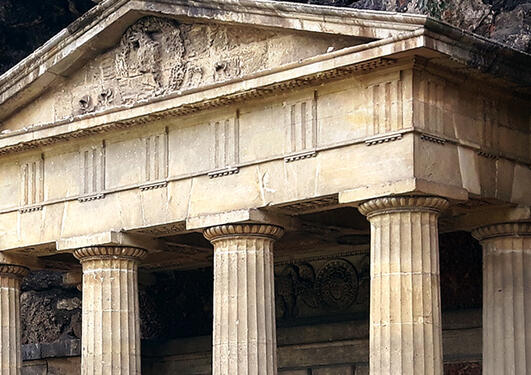Launch of COMMON ENDS network
Programme for workshop on cultural heritage - launch of COMMON ENDS network

Hovedinnhold
In this workshop we discuss current approaches to cultural heritage. We ask what are the changing politics and dynamics of cultural heritage sites and what they can tell us about the conflicting organization of society: concerning identity politics, rights to belong, the status of the commons, the relation between the public and the private; as well as conflicts between the local, the regional, the national and the international.
These questions are part of a broader global political agenda, but they also have corresponding effects on local circumstances and grassroots, and we invite speakers to discuss case-studies.
We often assume that identity, belonging and rights to cultural expressions, both tangible and intangible, are fundamental to peoples’ wellbeing and existence. But increasing land-use and development beyond the control of local people and local leadership has led to disputes over cultural resources. Cultural heritage sites function as drives for commercial tourism, gentrification and elitist appropriation – and, often, developments meant to create possibility and development instead tend to alienate. Scientific collecting tends to also create conflicts of similar sorts.
The ambition for these three days is to discuss the conflicts that come up in the handling of this particular source of wealth and wellbeing that we call cultural heritage, its government and its potential for mobilization in the current situation.
---
Sunday 27th October
We arrived in the afternoon at Panorama Hotel by car
19.00 DINNER
Monday 28th October
09.15 – 10.00 Welcome and introductions
Session 1: Definitions; paradoxes, dilemmas and aporias - Chair: Knut Rio
10.00 – 10.45 Michael Rowlands: The Dignity of Heritage: global justice and restitution debates.
10.45 – 11.30 Oscar Salemink: Heritage subjects and heritage objects: Some preliminary reflections
11.30 -12. 15 Terje Brattli: The subaltern other?
12.30 – 13. 30 LUNCH
Session 2: Issues of government and cultural heritage: Between state and non-state
Chair: Trond Lødøen
13.30 – 14.15 Anne K. Bang: From faith to heritage to faith in heritage: Experiences from two digital conservation programs in East Africa 2013-2019
14.15– 15.00 Graeme Were: Heritage and Memory in Post-Reform Vietnam
Coffee Break
15.15 – 16. 00 Gertjan Plets: Corporate Social Responsibility and Museums: heritage ethics in the age of neoliberalism?
16.00 – 16.45 Knut Rio: Cultural heritage tourism and peace in times of total war
17.00 – 18.00 Tore Sætersdal: Rain, snakes and rock art - working in the ancestral landscape of Manicaland
Frode Storaas shows the film “Both Sides”:
Manica District is today the land of Shona-speaking groups that also inhabit the adjacent Zimbabwe plateau. Earlier inhabitants, the San hunter-gatherers that once roamed the plains and the forests of Southern Africa, left their art on the rock walls of thousands of caves and shelters across the subcontinent. Many archaeological sites play an important part in the ceremonial and spiritual lives of people today, as part of the traditional ancestor beliefs. Maintaining good relationships with local authorities is important.
19.00 DINNER
Tuesday 29th October
Session 3: Cultural Heritage in conflict – Chair: Gertjan Plets
09.15 – 10.00 Hamed Salem: The Palestinian archaeological heritage: safeguarding a framework for future generations
10.00 – 10.45 Chiara de Cesari: Heritage and the Cultural Struggle for Palestine
11.00 – 11.45 Nils Anfinset: Changing politics, conflict, urban development and the role of culture heritage in Palestine
12.00 – 13.00 LUNCH
13.00 – 13.45 Sidney Cheung: Cultural Leakage and Transformation: A comparative study of Japanese kodo and Chinese incense tradition in the 21st century.
14.00 – 17.00 EXCURSION to the nearby Fjell Fortress, the biggest Nazi fortress in Norway during the Second World War, today run as a local museum.
19.00 DINNER
Wednesday 30th October
09.15 - 12.00 Discussion of project proposal and way forward for our network
13. 00 LUNCH
DEPARTURE OF PARTICIPANTS
